Guwahati/New Delhi, Dec 26: Home Minister Rajnath Singh on Thursday announced zero tolerance against Bodo militants in Assam, saying that they would be treated like terrorists.
 After visiting the affected districts of Sonitpur and Kokrajhar two days after the nation was shocked by the cold-blooded massacre of 78 people, Singh ruled out any dialogue with the militant NDFB(S) outfit, which was behind the violence, and directed the Assam government to start taking action against the perpetrators of terror.
After visiting the affected districts of Sonitpur and Kokrajhar two days after the nation was shocked by the cold-blooded massacre of 78 people, Singh ruled out any dialogue with the militant NDFB(S) outfit, which was behind the violence, and directed the Assam government to start taking action against the perpetrators of terror.
He also assured the state of Central assistance to fight terror, which could even extend to pressing the Army into action, though the Ministry of Home Affairs has already sent 50 companies of paramilitary forces to the state.
“I have spoken to the Assam Chief Minister (Tarun Gogoi), and we have decided to investigate the entire incident by the National Investigation Agency. We want to understand the links of such groups. We want to know with whom they have connections,” Singh told reporters at a press conference in Guwahati.
Singh said he was informed by External Affairs Minister Sushma Swaraj that “one of the premiers” of Bhutan and Myanmar has promised cooperation for flushing out terrorists from their territories.
Prime Minister Narendra Modi has taken serious note of the incident, and announced Rs 2 lakh each for the kin of the deceased, said the minister. He has also announced Rs 50,000 which will be paid from the Prime Minister’s National Relief Fund to those seriously injured.
“The prime minister wants to work for the country and this region. Some forces like this are interfering with it. But we will win over these forces. Such incidents are challenges for the nation,” said Singh.
The home minister said the Centre is treating the incident with utmost seriousness, as “such incidents are a challenge” to the nation. “We cannot overlook it as a simple act of militancy. It is an act of terror. Both the Central and the state government will deal with it the way terrorism is dealt with,” he said.
On Tuesday, heavily armed militants swooped down on rem¬ote Adivasi villages, killing 37 people in Sonitpur district, 25 in Kokrajhar and three in Chirang. Singh was not willing to treat the killings as another bout of ethnic clashes, which the state believes. He said: “Terrorists do not have religion, caste and region. They are only terrorists.”
Before flying to Assam, Singh convened a high-level meeting, attended by senior officials from intelligence agencies and the home and defence ministries, to assess the situation. It was decided in this meeting to take the Bodo militants head on.






Comments
Add new comment